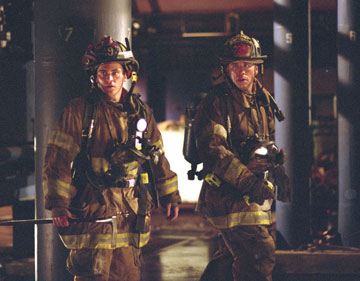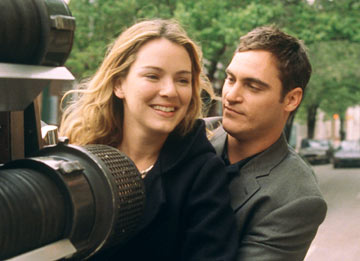

Given the heroism of the firefighters in New York after the World Trade Center attacks, it was inevitable that a film espousing the heroism of firefighters would arrive on screens. The Guys does not really count, since it was an independent film and nobody saw it. So along comes Ladder 49, a sappy story about the lives of firefighters on and off duty, and does not do justice to their real life counterparts. Ladder 49 is not a bad film per se, but tries so hard to be a good one that it is emotionally manipulative, and worse, seems to exploit the memory of deceased firefighters in order to sell more tickets. The film unfolds as a series of flashbacks in the life of 10-year veteran Jack Morrison (Joaquin Phoenix, The Village, Brother Bear). Morrison was in a burning building, and after helping a man escape, became trapped in the debris. As he lies there, his life unfolds before his eyes, and the other firefighters, especially Mike Kennedy (John Travolta, The Punisher, Basic), race to figure out a way to rescue him.
There is no cohesion in Lewis Colick's (Domestic Disturbance, October Sky) screenplay. Because it is a bunch of clips strung together with shots of Morrison struggling to survive, it plays like a Cliff's Notes version of Morrison's life. The development is minimal, instead, Colick and director Jay Russell (Tuck Everlasting, My Dog Skip) hit all of the highs and lows of the past decade. Rookie mistakes, weddings, kids, and co-worker deaths flash across the screen quickly, each segment calculated to evoke tears of sadness or joy. Morrison and his girlfriend and later wife Linda (Jacinda Barrett, The Human Stain, Urban Legends: Final Cut) seem to look exactly the same as they did when they first met. Although they look cute together, neither Russell nor Colick give a good sense on why they like each other.
Worse is the portrayal of Morrison. Ladder 49 spends a decent amount of time on his rookie years, where he is unsure of himself and still learning the ropes. As time moves forward, Russell spends less time on the job and more time with Linda. So by the time the flashbacks catch up to the present, nobody watching feels that Morrison improved in his role as a firefighter. The only way people know is because Kennedy says so. If the Morrisons and Kennedy are rough character sketches, the rest of the firemen are just background filler. There is an older guy, a skinny guy, a big white guy, and a big black guy. Later, a smallish Hispanic guy enters the picture. Okay, it's not as simple as that, but it is hard to mourn for the dead when one has little clue of who that person even is, as is the case with the first person to die.
Part of what Russell attempted to do what show that while firefighters are heroic, they can be human. Thus, he spent a lot of time away from fires, showing male bonding, goofing off, conflict, and other non-fire related things. What he misses is that the filler that occurs between all of these highs and lows is the stuff that truly develops the characters. The episodic nature of Ladder 49 ruins any sense of continuity. One of the tensions in the Morrison marriage is the constant threat of death for Jack. This should be a big issue, and instead, gets the mini-treatment before the story moves on to something else.